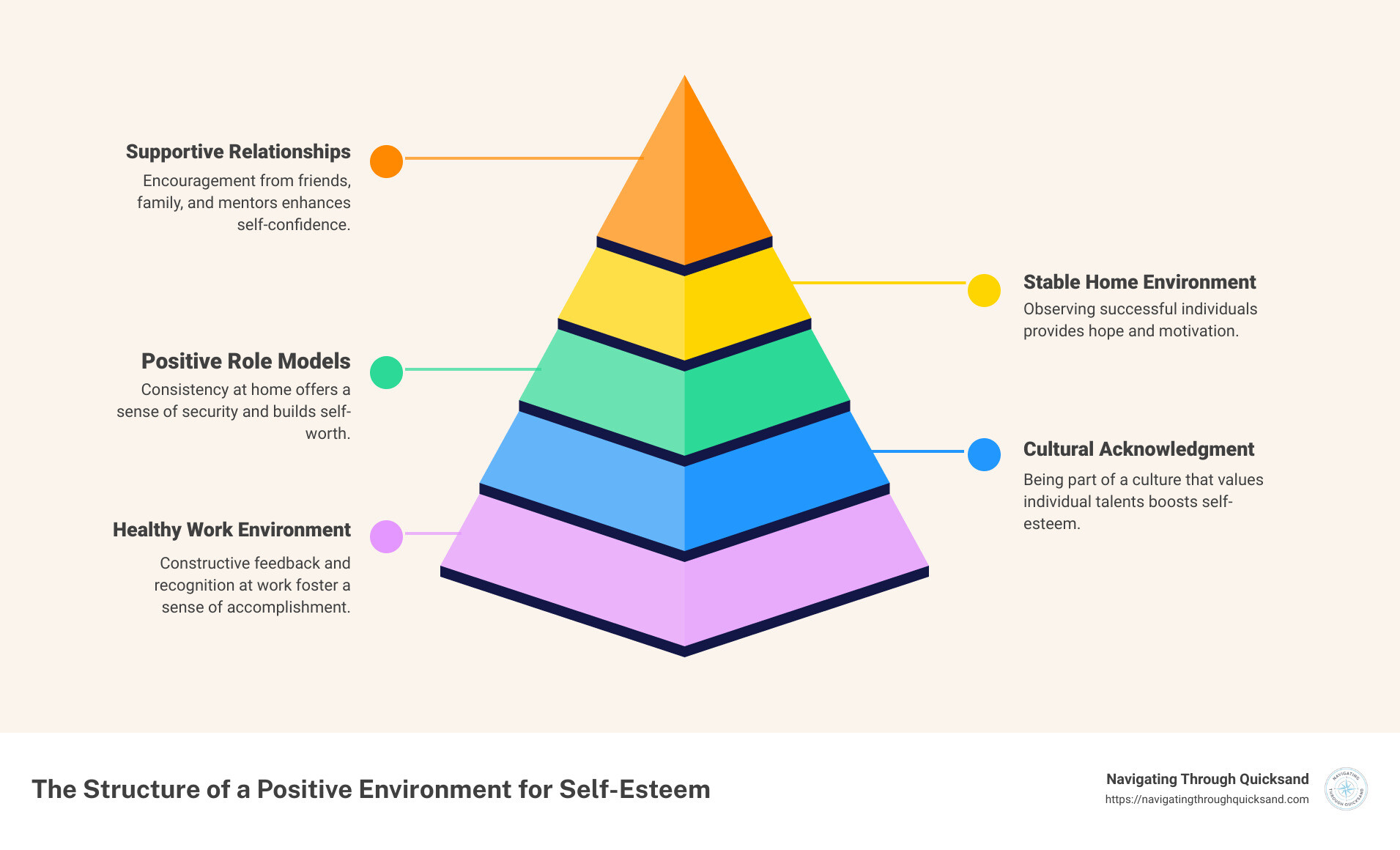Understanding self-esteem is fundamental to recognizing the significant impact our surroundings have on how we perceive ourselves. Whether it’s the warmth of stable relationships, the guidance of a mentor, or the comfort of a nurturing home, each aspect of our environment can either uplift or dampen our spirit.
Just as a plant thrives in the right soil, sunlight, and water, our self-esteem blossoms in environments that provide the right balance of support, challenge, and acknowledgment. It’s not just about being in a “happy” place but being somewhere that actively contributes to our sense of worth and encourages us to grow beyond our perceived limitations.
How does a positive environment contribute to healthy self-esteem?
A supportive environment plays a crucial role in building healthy self-esteem by offering love, acceptance, and opportunities for personal growth.
Here’s a quick look at the key ways a positive environment boosts self-esteem:
- Supportive Relationships: Encouragement from friends, family, and mentors enhances self-confidence.
- Stable Home Environment: Consistency at home gives a sense of security and self-worth.
- Positive Role Models: Observing successful role models provides hope and motivation.
- Cultural Acknowledgment: Being part of a culture that values individual talents and achievements can elevate self-esteem.
- Healthy Work Environment: Constructive feedback and recognition at work boost confidence and a sense of accomplishment.

In this guide, we’ll explore these environments in detail to understand how exactly they feed into our self-esteem and what steps we can take to cultivate such positivity around us.
Table of Contents
Whether you’re feeling stuck or overwhelmed, know that the environment you’re in and the people you surround yourself with have the power to change the course of your journey towards personal growth and success.
The Role of Supportive Relationships in Building Self-Esteem
Supportive relationships are like sunlight for plants; they help us grow, thrive, and bloom into our best selves. Whether it’s family, friends, or mentors, these relationships play a crucial role in shaping our self-esteem. Let’s dive into how each of these relationships contributes to building a healthy sense of self-worth.
Family
Imagine your family as the foundation of a house. When the foundation is strong, the house can withstand storms and challenges. Similarly, a positive family environment, characterized by love, support, and understanding, lays the groundwork for strong children’s self-esteem. Studies show that parental warmth and consistent praise can significantly boost a child’s self-confidence.
By showing affection, accepting and encouraging their children, parents act as the first and most influential role models, teaching kids that they are valued and capable individuals. In this nurturing environment, children develop a healthy sense of self-worth and a positive self-image, equipped with the confidence and resilience to navigate life’s ups and downs.
Friends
Friends are the mirrors that reflect our best and worst sides, helping us see ourselves in a new light. Good friends uplift us, make us feel included, and appreciate us for who we are. They provide a sense of belonging and acceptance that is vital for our self-esteem. Encouraging friendships where there’s mutual respect and understanding fosters a positive self-image and helps us navigate the ups and downs of life with confidence.
Mentors
Mentors are the guiding stars in our journey of personal and professional growth. They are the ones who’ve walked the path before us and can share wisdom, insights, and encouragement. By setting an example through their actions and achievements, mentors inspire us to believe in our potential and persevere through challenges. Their faith in our abilities and constructive feedback helps us develop resilience and a stronger belief in ourselves.
The Synergy of Supportive Relationships
All these relationships contribute uniquely to our self-esteem. Family provides the foundational love and acceptance, friends offer companionship and belonging, and mentors give guidance and inspiration. Together, they create a supportive ecosystem that nurtures our self-worth and empowers us to face life with confidence.
Navigating Challenges Together
Life isn’t always smooth sailing, and it’s during the tough times that these relationships prove their true value. Whether it’s family rallying around us, friends lending an ear, or mentors offering sage advice, having a support system can make all the difference. They remind us of our strengths and help us see light at the end of the tunnel.
Let’s not underestimate the power of supportive relationships in building our self-esteem. Cultivating and maintaining these connections can be one of the most rewarding investments we make in ourselves and our journey towards personal fulfillment.
[In the next section, we’ll explore how positive home and work environments further contribute to our self-esteem, providing stability, recognition, and encouragement that fuel our growth and happiness.]
How Positive Home and Work Environments Contribute to Self-Esteem

Creating a positive environment, both at home and work, is like planting a garden. When the conditions are right, everything flourishes. Let’s delve into how stability, recognition, and encouragement act as the sunlight, water, and soil for our self-esteem garden.
Stability: The Foundation of Growth
Imagine your self-esteem as a house. Without a solid foundation, the house can’t stand firm. Stability in our environments provides this foundation, offering a sense of security and predictability. When we know what to expect in our home and work life, it’s easier to focus on personal growth and development. A stable environment, free from chaos and uncertainty, allows us to build a strong sense of self and navigate life’s challenges with confidence.
Recognition: The Sunlight for Our Spirits
Being recognized for our efforts and contributions is like basking in sunlight. It warms us and encourages further growth. At work, when our achievements are acknowledged, it not only boosts our self-esteem but also motivates us to strive for excellence. Similarly, at home, when our talents and efforts are appreciated, we feel valued and understood. This validation is crucial for nurturing a healthy self-image and fostering a sense of belonging and purpose.
Encouragement: The Water and Soil for Our Potential
Encouragement acts as both the water and soil for our self-esteem. It nourishes and supports our growth, allowing us to blossom into our best selves. In a positive environment, encouragement comes from believing in each other’s potential and providing support through challenges. It’s about more than just offering compliments; it’s about empowering each other to take risks, learn from failures, and celebrate successes. Whether it’s a family member cheering us on or a colleague offering constructive feedback, encouragement gives us the resilience to persevere and the courage to explore new opportunities.
In Summary:
- Stability provides a secure foundation, allowing us to focus on growth.
- Recognition acts as sunlight, warming our spirits and motivating us to achieve more.
- Encouragement is the water and soil, nourishing our potential and supporting our journey.
As we transition into exploring the impact of social and physical environments on self-perception, the positive environments we cultivate at home and work are pivotal in shaping our self-esteem. They offer us the stability, recognition, and encouragement needed to navigate life’s challenges and embrace our true potential.
The Impact of Social and Physical Environments on Self-Perception

Community
Our community—the people and places we interact with daily—plays a big role in how we see ourselves. When we’re part of a community that uplifts and supports each other, it’s like a boost to our self-esteem. Positive feedback and encouragement from those around us make us feel valued and understood.
On the flip side, if we’re in a community filled with negativity or criticism, it can make us doubt our worth and abilities. It’s important to surround ourselves with people who make us feel good about ourselves and encourage us to pursue our goals.
Nature
Spending time in nature has a surprisingly powerful effect on our self-perception. Nature doesn’t judge; it accepts us as we are, which can help us do the same for ourselves. Studies have shown that physical activities in natural settings can shift our focus from how we look to appreciating what our bodies can do. This shift from an aesthetic to a functionality-focused view of our bodies promotes a healthier self-image and boosts self-esteem.
Exercise
Exercise is another crucial element. When we engage in physical activities, especially in natural environments, it’s not just our body that gets a workout—our self-esteem does too. Exercise releases endorphins, which make us feel good, and when we see progress in our physical abilities, our self-confidence grows.
But it’s not just about the physical benefits. Exercise can also be a source of joy and a way to connect with our bodies on a deeper level. It teaches us resilience and shows us that we can overcome challenges, both physical and mental.
As we move towards strategies for creating positive environments, remember: the community you choose, the time you spend in nature, and how you engage in physical activities can significantly influence how you view yourself. These elements combined can create a powerful foundation for building and maintaining healthy self-esteem.
Strategies for Creating a Positive Environment

Creating a positive environment is like planting a garden. It requires care, attention, and a bit of know-how. Let’s dive into the essentials: Communication, Boundaries, and Positive Reinforcement. These strategies are your tools for nurturing a space where self-esteem can flourish.
Communication: The Heart of Connection
Think of communication as the water that keeps the garden of your environment thriving. Open, honest, and positive communication fosters understanding and trust. Here’s how to get it right:
- Listen More Than You Speak: Show genuine interest in others’ thoughts and feelings. This makes them feel valued and respected.
- Be Clear and Kind: Whether at home or work, express your needs and opinions in a way that’s straightforward but considerate.
- Encourage Open Dialogue: Create an atmosphere where everyone feels safe to share their ideas and concerns without fear of judgment.
Boundaries: The Protective Fence
Boundaries are the fence that keeps the good in and the bad out. They help ensure that relationships are mutually respectful and supportive. Here’s how to establish healthy boundaries:
- Know Your Limits: Understand what you are comfortable with and what you’re not. This applies to your time, energy, and emotional availability.
- Communicate Your Boundaries Clearly: Once you know your limits, communicate them to others. It’s okay to say no.
- Respect Others’ Boundaries: Just as you want your boundaries respected, do the same for others. This mutual respect creates a positive, supportive environment.
Positive Reinforcement: The Sunlight
Positive reinforcement is the sunlight that helps the plants in your garden grow. Recognizing and praising positive behavior encourages more of the same. Here are some ways to apply it:
- Catch People Doing Good: Be on the lookout for positive actions and qualities in others. Acknowledge and praise these moments.
- Be Specific with Praise: Instead of general compliments, be specific about what someone did well. This shows you’re paying attention.
- Encourage Effort, Not Just Success: Recognize the effort, not just achievements. This teaches resilience and the value of hard work.
By focusing on communication, boundaries, and positive reinforcement, you’re laying the groundwork for a positive environment. Whether it’s at home, work, or within your community, these strategies help create a space where everyone feels valued, respected, and supported. In turn, this nurtures healthy self-esteem, allowing individuals to thrive.
Creating a positive environment is an ongoing process. It takes time, effort, and patience. But the rewards—a space where self-esteem can bloom—are well worth it.
Navigating Challenges and Maintaining Self-Esteem

In the journey of life, encountering challenges is inevitable. How we navigate these challenges plays a crucial role in maintaining our self-esteem. Let’s dive into how resilience, problem-solving, and self-care can be our allies in this journey.
Resilience: Your Emotional Armor
Think of resilience as your emotional armor that protects your self-esteem. It’s about bouncing back from setbacks without losing faith in yourself. Studies have shown that resilience can be boosted by acknowledging your strengths and learning from past experiences. Every challenge is an opportunity to grow stronger.
Problem-solving: A Key to Confidence
When faced with a problem, the way you approach it can either build or break your self-esteem. Start by breaking the problem down into manageable parts. This makes it less overwhelming and easier to tackle. Celebrating small victories in problem-solving boosts your confidence and reinforces your belief in your abilities.
Self-care: The Foundation of Self-Esteem
Self-care is not just about pampering yourself; it’s about respecting your needs and acknowledging your worth. Regular self-care practices—like enough sleep, healthy eating, and exercise—improve your physical and mental health, forming a strong foundation for self-esteem. Taking care of yourself is a sign of self-respect, not selfishness.
Navigating Through Challenges
When facing challenges, remember the power of positive reinforcement. Surround yourself with people who believe in you and your abilities. Their support can be the boost you need to overcome obstacles and maintain your self-esteem.
Lastly, don’t forget the importance of flexibility. Sometimes, the path to overcoming a challenge involves adapting and finding new ways to approach the situation. Being open to change is a sign of strength, not weakness.
In conclusion, navigating challenges with resilience, effective problem-solving, and consistent self-care can significantly contribute to maintaining healthy self-esteem. It’s about recognizing your worth, learning from experiences, and taking care of your well-being. You have the strength within you to face and overcome the challenges life throws your way.
Conclusion
At Navigating Through Quicksand, LLC, we understand that life can sometimes feel like you’re stuck in quicksand, with each challenge pulling you deeper into uncertainty. However, just as we’ve seen through research and real-life stories, the environment around us plays a pivotal role in either anchoring us firmly or allowing us to free ourselves and thrive.
Creating and maintaining a positive environment is essential for boosting self-esteem. This involves surrounding ourselves with people who uplift us, engaging in work that fulfills us, and participating in communities that embrace us for who we are. It’s about finding those pockets of positivity that encourage growth, resilience, and self-acceptance.
How a positive environment contributes to healthy self-esteem isn’t just a concept—it’s a practice. It requires conscious effort to seek out, create, and nurture spaces that reflect the best parts of ourselves and our world. It’s about making choices every day that align with the kind of person we want to be and the life we want to live.
At Navigating Through Quicksand, LLC, we’re dedicated to supporting you on this journey. Whether through workshops, presentations, or one-on-one coaching, we’re here to help you build the skills and find the courage to navigate through life’s challenges. Together, we can discover how to transform the quicksand that holds us back into solid ground that propels us forward.
In the end, the environments we cultivate and choose to be part of shape our self-esteem and our paths in life. By fostering positivity in our surroundings, we not only enhance our self-view but also contribute to a world where everyone can feel valued, supported, and empowered to achieve their fullest potential.
Let’s embark on this journey together. Let’s create environments that uplift, inspire, and bring out the best in us and those around us. Join us at Navigating Through Quicksand, LLC, and let’s turn adversity into strength, one step at a time.
Frequently Asked Questions about Positive Environments and Self-Esteem
How does a positive environment contribute to healthy self-esteem?
A positive environment acts like sunlight for plants; it helps self-esteem grow. When you’re in an environment that’s encouraging, where people support and believe in you, it’s easier to see your own value. Think of it this way: if you’re constantly told you’re capable and loved, you start to believe it. Positive feedback, recognition for your efforts, and feeling safe enough to express yourself all nurture a healthy self-esteem.
- Support and Encouragement: Like cheerleaders on the sidelines, having people who encourage you makes a big difference.
- Recognition and Appreciation: Getting acknowledged for what you do helps you feel valuable.
- Safety to Express Yourself: Being able to show the real you without fear builds confidence.
What are the signs of a negative environment affecting self-esteem?
A negative environment can be like walking under a cloud; it dampens your self-esteem. Here are some signs to watch out for:
- Constant Criticism: If you’re always hearing about what you’re doing wrong but never what you’re doing right, that’s a problem.
- Lack of Support: Feeling like you’re on your own, without a safety net, can make you doubt your worth.
- Disrespect for Boundaries: If people constantly overstep your boundaries, it can make you feel undervalued.
How can I create a more positive environment for myself and others?
Creating a more positive environment is about planting seeds of positivity and watching them grow. Here are some ways to do it:
- Be the Change: Start with yourself. Offer compliments, support, and encouragement to others.
- Set Boundaries: Teach people how to treat you by setting clear boundaries.
- Communicate Positively: Focus on positive communication. Highlight what’s going well, not just what needs improvement.
- Encourage Openness: Create a space where people feel safe to express themselves without judgment.
A positive environment plays a pivotal role in nurturing healthy self-esteem, influencing emotional and mental health. When individuals, especially children, are surrounded by positivity, they develop a strong sense of self-worth and a positive self-image. This high self-esteem allows them to feel confident, assured, and aware of their abilities and individual differences. In such an environment, they are encouraged to express themselves and recognize their emotions, leading to a better understanding of their own personalities and emotions.
Positive role models within the family and home environment further contribute to their emotional well-being and confidence levels. Through supportive relationships and encouragement, children thrive, feel loved, and are inspired to learn new skills, creating happy memories that shape their lives. Ultimately, a positive environment not only fosters healthy self-esteem but also equips individuals with the resilience to navigate challenges and maintain a positive outlook on life.
In conclusion, a positive environment is crucial for nurturing healthy self-esteem. It’s about being in a place where you’re valued, supported, and encouraged. Whether it’s at home, work, or in your social circles, cultivating a positive environment can have a profound impact on how you see yourself and how you interact with the world. The effort you put into fostering positivity not only benefits you but those around you as well.



